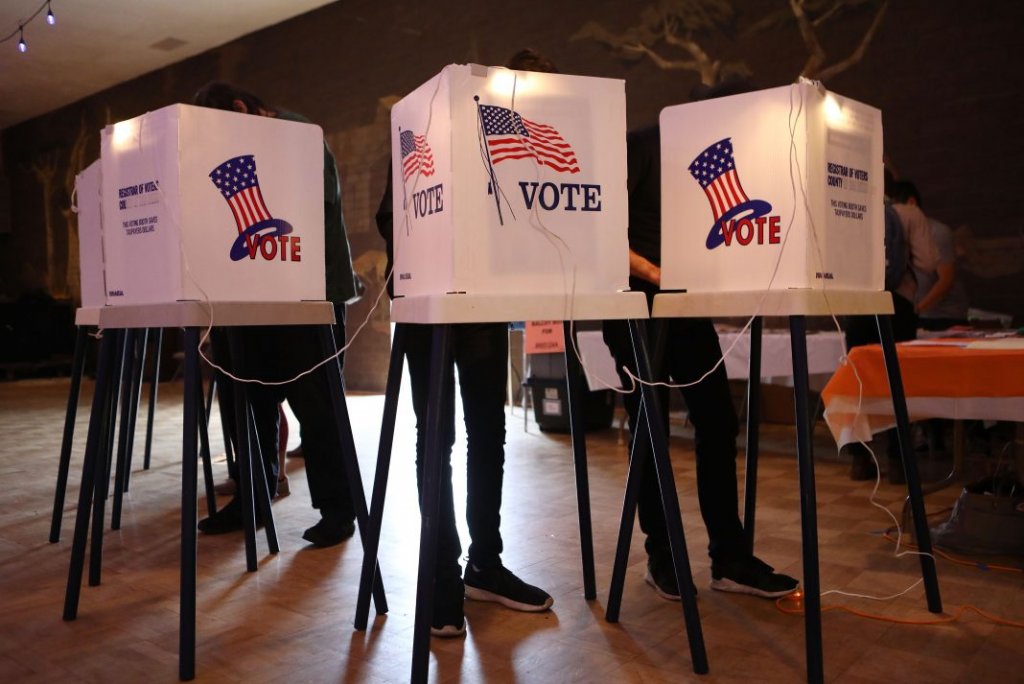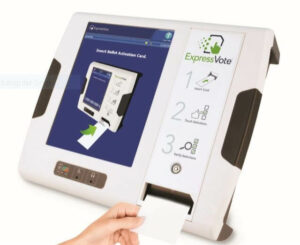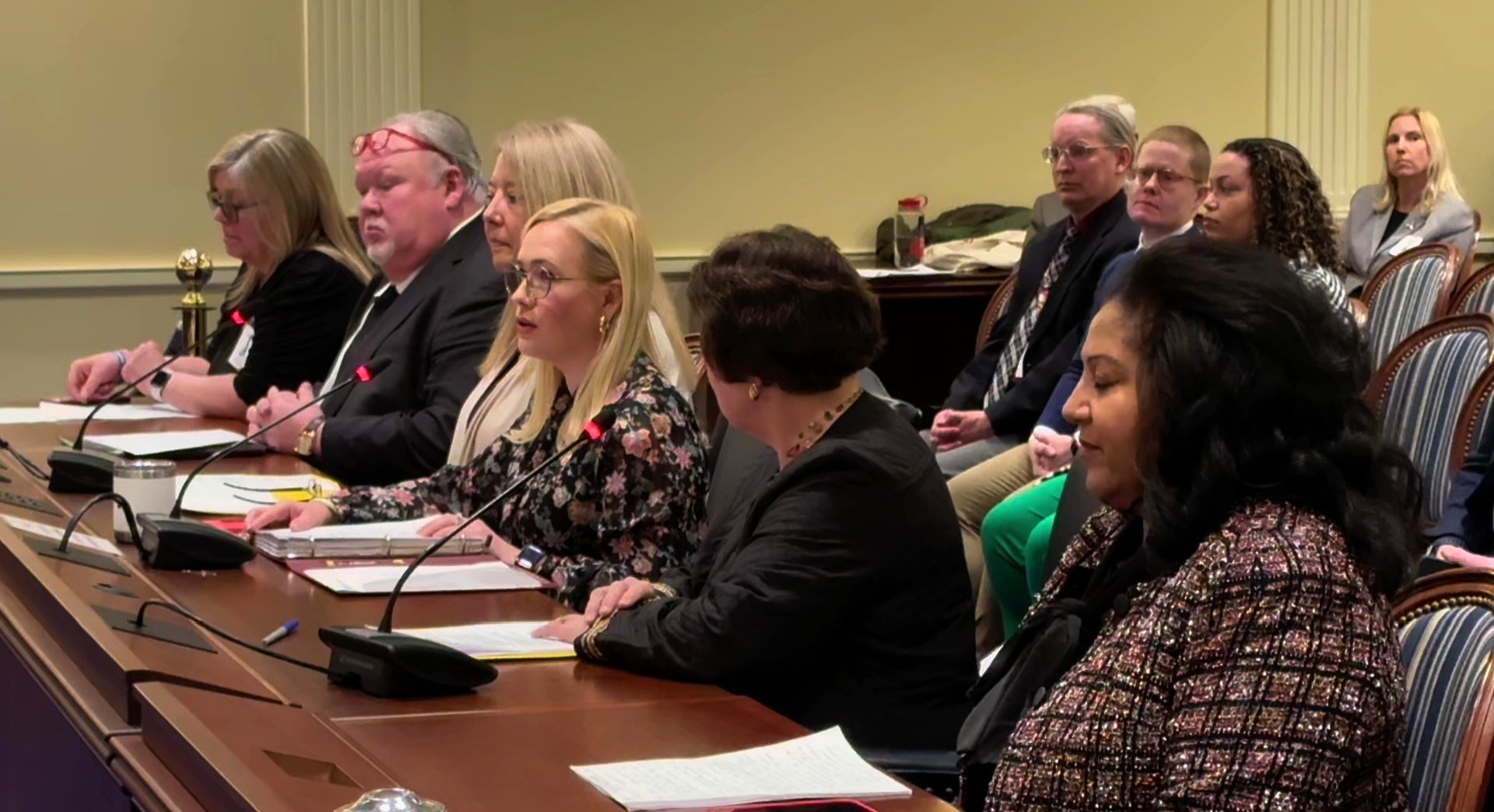Disability Rights Groups Seek Equal Access to Ballot through Voting Machine Bill, Lawsuit

A Maryland lawmaker wants all of the state’s voters to mark their ballots with devices rather than by hand, arguing that the move would make voting more equitable for people with disabilities.
Maryland voters currently have the option of using a ballot marking device at in-person polling locations. According to the Maryland State Board of Elections website, those devices produce “a voter verifiable paper record and [allow] voters with disabilities to vote privately and independently.”

The ExpressVote ballot marking device used in Maryalnd. Maryland State Board of Elections image.
But the ballots used by Maryland’s current devices look different than those marked by hand: Jonathan Lazar, professor in the University of Maryland’s College of Information Studies, described them as “skinny” ballots. He said that means ballots filled out by voters via ballot marking devices are easily distinguishable compared with ballots filled out by hand.
House Bill 423, introduced by Del. Jessica M. Feldmark (D-Baltimore and Howard counties) would introduce universal ballot marking devices, and require that ballots cast by voters with disabilities “may not be set apart or distinguishable, in size and form, from a ballot cast by a voter without a disability.”
“Maryland needs to provide equal access to the ballot, so that voters with disabilities enjoy the same access to a secret ballot,” Feldmark said at a Tuesday House Ways and Means Committee meeting.
Current law already requires the state’s voting system to “provide access to voters with disabilities that is equivalent to access afforded voters without disabilities without creating a segregated ballot for voters with disabilities,” according to a Department of Legislative Services analysis of the bill, but advocates charge that the state’s current system amounts to segregation.
The National Federation of the Blind filed a lawsuit in Maryland in 2019, seeking to require the state to offer ballot marking devices to every in-person voter as the default method of voting, with paper ballots offered only to those voters who opt out of using the device or in cases where there are long lines. In January, the state and federation agreed to pause the case to allow for continued negotiations.
Ronza Othman, the president of the National Federation of the Blind of Maryland, emphasized that Feldmark’s bill would not get rid of paper ballots in Maryland. Rather, the legislation would require everyone to mark a physical ballot using the same method.
“We have segregated voting in Maryland for us,” Othman said. “We have to get in a line that is different from the line everybody else gets in to vote.”
Cheryl Gottlieb, a Towson resident and disability rights activist who has cerebral palsy, uses a ballot marking device when she votes. She told lawmakers Tuesday that she’s had “significant difficulty” every time she’s gone to vote because the few ballot marking devices currently available at the state’s polling locations aren’t easily accessible.
Gottlieb uses a powered wheelchair, and said she’s even encountered ballot marking devices that aren’t located in wheelchair-accessible areas.
“If every single person voted the same way, we wouldn’t be having these kinds of issues,” she said.
But some oppose the bill due to the anticipated cost of purchasing or leasing universal ballot marking devices: According to a Department of Legislative Services analysis of the bill, the state’s general fund expenditures would increase by at least $5.4 million in the 2022 fiscal year, at least $5.2 million in fiscal 2023 and 2024, and by at least $4.8 million in the years after that.
The fiscal analysis notes that local governments would have to spend roughly the same amount.
Kevin Kinnally, the Maryland Association of Counties’ legislative director, said his organization agrees that something must be done to ensure equal ballot access – but opposes the legislation due to what he described as an “unfunded mandate” on local government.
Sharon Maneki, a previous president of the National Federation of the Blind of Maryland, raised questions about the analysis’ projected costs. She said some of the bill’s estimated costs seem “trumped up,” like buying entirely new tables for ballot marking devices instead of using the ones already owned by the state.
According to the analysis, the state would need to lease an additional 18,000 ballot marking devices if the bill is enacted.
Expanding the state’s public campaign financing
Del. Gabriel Acevero (D-Montgomery) wants to expand the state’s public financing program, which currently only applies to gubernatorial races, to include state senators and delegates.
Acevero said public financing, in which public funds are used to match contributions to candidates who pledge to accept only smaller donations, makes running for office more accessible to a wide range of people.
“It shifts the balance of power in favor of people,” Acevero said.
The bill would allow candidates to take advantage of the state’s Fair Campaign Financing Fund. It would also dramatically increase that fund, which currently has a balance of $3.8 million, according to a Department of Legislative Services analysis of the legislation.
According to the analysis, the state would need to allocate $21.9 million in general fund revenues to the Fair Campaign Financing Fund in the 2022 fiscal year if the bill is enacted, $22.7 million in fiscal 2023 and an “indeterminate amount” by 2026. Full funding of the program for the 2022 elections isn’t mandated, according to the analysis.
The bill also gives the State Board of Elections the authority to impose up to $1,000 in civil penalties for violations of the public financing system’s rules.
Joanne Antoine, the executive director of Common Cause Maryland, said it’s only getting more expensive to run for office in Maryland. She said candidates for the Maryland Senate average $266,000 in donations, and candidates for the House of Delegates average more than $125,000.
“Just hearing those numbers really is intimidating,” she said.
A similar bill received initial hearings in both the House and Senate last year, but didn’t make it out of committee.
Feldmark also proposed her own reform to the state’s public financing system, which would change how public funds are used to match campaign contributions. Feldmark’s proposal would feature a tiered funding structure, meant to provide more public funding to match smaller donations.
Feldmark’s proposal would also provide more funding for the Fair Campaign Financing Fund, according to an analysis of the bill, to the tune of $2.2 million in the 2022 fiscal year and $4 million in 2023.
“Public campaign financing doesn’t do us any good if there’s no funding to finance a campaign,” Feldmark said.
Banning guns at polling centers
House Bill 450, introduced by Del. Shaneka T. Henson (D-Anne Arundel), would ban anyone, aside from official security and law enforcement, from bringing a gun within 100 feet of a polling site.
Henson argued that guns “have no place at an election site” and said the bill is aimed at preventing instances of voter intimidation. Several advocates, including Annapolis business owner Jared Littman, told lawmakers that seeing someone with a gun at a polling center is intimidating.
“Encountering a civilian with a gun at a polling location is threatening,” Littman said.
Ten other states and Washington, D.C. have similar laws. Among them are Florida, Ohio and Texas, Henson said.
Current Maryland law bans people from being “attired and equipped, in a manner which creates the appearance that the individual is performing an official or governmental function in connection with an election,” including carrying or displaying a gun or badge within 100 feet of a polling site on election day.
Second Amendment advocates, however, criticized Henson’s proposal as overly broad. Mark Pennak, the president of the gun rights group Maryland Shall Issue, took issue with the fact that it would affect Marylanders with a legal concealed carry permit.
“It reaches too broadly,” he said.
Pennak said he’d be in favor of banning the open carry of firearms at polling places.




 Creative Commons Attribution
Creative Commons Attribution